Non-formal youth work on European Citizenship
in the framework of the «Youth in Action» programme
» An attempt to develop project characteristics
Some words of caution
European Citizenship is a term cherished by many and is being used in a wide range of contexts — to an extent that it probably qualifies as one of the discursive impossibilities of our times.
Much is done with, for and about European Citizenship. Youth work is only one part of the larger picture (arguably an important one), and so is community work in non-formal education contexts. At European level, they come together in a number of settings, some of which are institutionalised and others provided by civil society. The «Youth in Action» programme of the European Union certainly is a key scheme in support of non-formal youth work on European Citizenship, and is the reference framework for this text.
Back in 1998, the EU partnered with the Council of Europe to run a series of pilot courses and modules on European Citizenship. It is from this experience that we try to highlight some basic characteristics of non-formal youth work projects on European Citizenship.
Obviously, much more could be said on such projects than we can say on these pages. We had to make choices, and warmly invite you to challenge our preferences. Other selections could be made, and we are not only open to discuss alternatives but also encourage you to explore these in practice.
We know that no generalisation we can make will ever apply perfectly: the richness of youth work is elaborate beyond imagining. Yet, the discourse on recognition and valorisation of non-formal learning and youth work remains a political priority and continues with or without practitioners. Hence we better start discussing characteristics of youth work within the community of practitioners and contribute our own experiences from reality, before others define criteria for our work on our behalf without our voice being heard.
You are currently reading a contribution of Frankly Speaking to the many discourses and discussions on quality, recognition and validation of non-formal education and learning.
If you prefer to read a paper version, please download the pdf-version [500 kb].
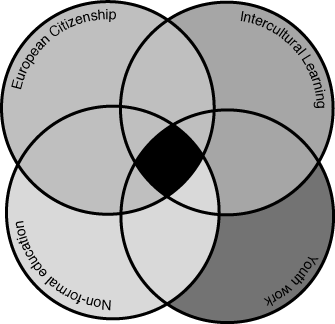
The starting point
The European Union youth programme «Youth in Action» has just entered its third generation and spans over 7 years from 2007 to 2013.
Under its Priority 1 «European Citizenship» it brings together four spheres or fields in a specific constellation, namely youth work, non-formal education, intercultural learning, and European citizenship. All of these four areas can evidently stand on their own and in themselves are huge and diverse themes to explore.
In other words: When we speak of basic characteristics of non-formal youth work projects on European Citizenship, we only mean projects combining all four areas in their approach — not to discredit any other kind of youth work or non-formal education, but rather to remain in the realm of the «Youth in Action» programme. That said, we believe our thinking and the suggested model deriving from our thoughts could easily be applied to other contexts and constellations, but this is for the future.
On importance, relevance and antagonism
We believe that in a non-formal youth work project on European Citizenship, none of the four spheres is more important than the others and that the fields of youth work, non-formal education, intercultural learning, and European citizenship are related to one another (and indeed, to a certain extent also overlapping) and therefore are not in antagonistic competition but rather complementary. We have chosen to visualise this by means of a wheel (or ring or circle):
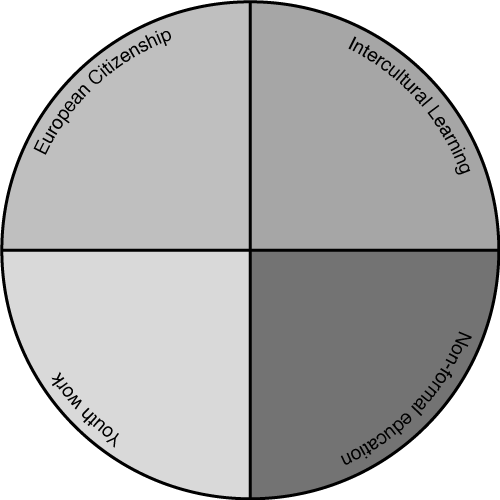
This graphic and the underlying assumption both imply that only when all four aspects are considered equally and brought together successfully, can a project be considered a non-formal youth work project on European Citizenship — in this particular framework.
Again, this is not a set of quality criteria suggesting that any other youth work, non-formal activity, or community work on European Citizenship is not high-quality. It merely is a set of characteristics operationalising the principles and foundations of the «Youth in Action» programme and its first priority.
Most importantly we want to underline and acknowledge that there are too many situations in which people are trapped in realities so restrictive, so despairing, that applying our ideal-case scenario does not arise at all.
That our model excludes youth work under such desperate circumstances, does not de-value the courageous work done there — on the contrary, it simply shows the limits of this particular approach (some of which we look at in more detail later).
On principles and values
It is often suggested that non-formal youth work on European Citizenship is based on a shared belief in common principles and values — in fact, that non-formal education and youth work as a whole are based on such commonalities. We argue that this, if you so want, collective philosophy does indeed exist and can best be described by the notions of human rights (as the main foundational principle of the Council of Europe), democracy (as the voluntarily chosen form of government in respect of human rights within and beyond the European Union) and peace (as the main initial motivation for the co-operation in Europe since 1945).
Clearly, all three notions are associated with different histories and carry diverse connotations in particular contexts. But while, to take but one example, the value of a singular human right might be under scrutiny, the principle of human rights as both a system of belief and a set of legal instruments is not questioned fundamentally — and therefore can be considered an essential element of what could be called the collective philosophy (or the common principles and values) of non-formal youth work on European Citizenship.
Hence, the wheel looks now like this, exemplifying that human rights, democracy and peace are not only the principles of our work, but also inform its implementation and practice and are, at the same time, also aim of our work in the sense that all three notions need constant renewal and reaffirmation, to which non-formal youth work on European Citizenship contributes:
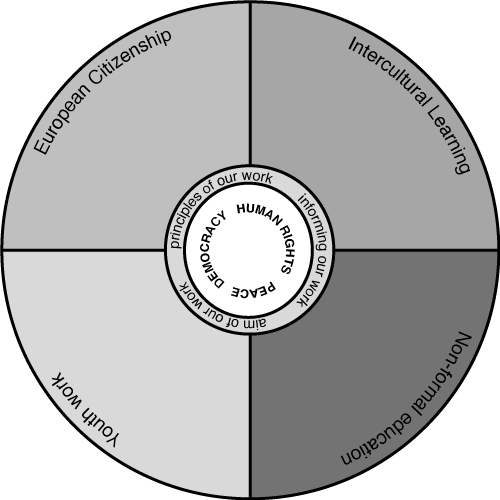
On European Citizenship
In a nutshell, we consider European Citizenship a notion based on shared values (which we argued before can be subsumed under human rights, democracy and peace); disassociated from belonging to a particular territory and connected with voluntarily chosen belongings to value-based communities of practice; a complementary rather than an exclusive identity; an ongoing process of re-negotiating power structures and relations (rights and responsibilities, theories and practices) among and between citizens themselves as well as citizens and institutions; an active role of citizens in their different communities across social, cultural, economic and political domains; locally rooted practice and collective work in progress.
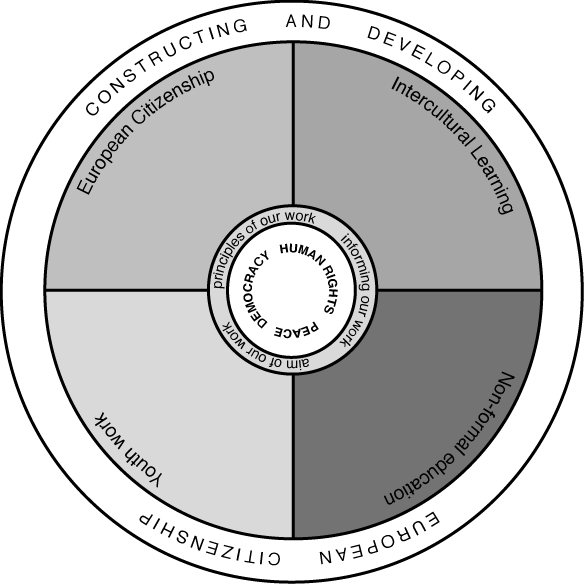
In our context (in particular Priority 1 of the «Youth in Action» programme), European Citizenship is not only part of the practice we look at; it also is an aim. The projects we consider here aim at actively and collaboratively constructing and developing European Citizenship through non-formal youth work.
Thus, to begin with, the wheel should be adjusted accordingly to reflect this double meaning (see the graphic on the right).
From our understanding of European Citizenship as a conceptual notion (see our specific paper on European Citizenship), five basic characteristics can be drawn. On that basis, non-formal youth work projects on European Citizenship should (in no specific order of priority):
- be collective (encourage and work with European communities of practice),
- be inclusive (take up and take in diverse forms of active, democratic citizenship),
- be holistic (address values and beliefs as well as attitudes, knowledge and skills),
- be multi-dimensional (include several dimensions of identity, belonging, practice),
- be power-conscious (locate interactions with larger frameworks of power).
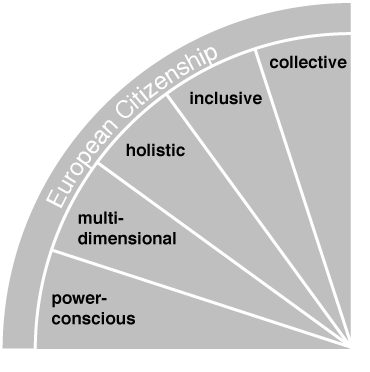
Evidently, more characteristics could be thought of, significantly that non-formal youth work projects on European Citizenship should lead to action and transformation — how could youth work projects otherwise construct European Citizenship at the same time as exploring European Citizenship?
Some of these characteristics (also this specific one) we do take up in other areas, and we usually have done so by informed choice (for example, not only youth work on European Citizenship, but all youth work should be transformative). As we have emphasized before, the areas and the characteristics are related and therefore necessarily intersect.
On non-formal education
The working paper «Pathways towards validation and recognition of education, training and learning in the youth field», a joint discussion document by the European Commission’s Youth Unit and the Council of Europe’s Youth Department commissioned in early 2004, states that:
“Principles in the field of non-formal and informal learning in youth activities are manifold:
- the voluntary and often self-organised character of learning, the intrinsic motivation of participants;
- the close link to young people’s aspirations and interests, the participative and learner-centred approach;
- the open character and structure, the transparency and flexibility of the underlying curricular construction;
- the evaluation of success and failure in a collective process and without judgement on individual success or failure, the ‘right to make mistakes’;
- a supportive learning environment;
- a preparation and staging of activities with a professional attitude, regardless of whether the activity is run by professional or voluntary youth workers and trainers;
- the sharing of results with the interested public and a planned follow-up.”
Pathways towards validation and recognition of education, training and learning in the youth field. Working paper by the Youth Unit of the Directorate ‘Youth, Civil Society, Communication’ in the Directorate General ‘Education and Culture’ of the European Commission and the Youth Department of the Directorate ‘Youth and Sport’ in the Directorate General ‘Education, Culture and Heritage, Youth and Sport’ of the Council of Europe. Strasbourg and Brussels, February 2004: p. 6.
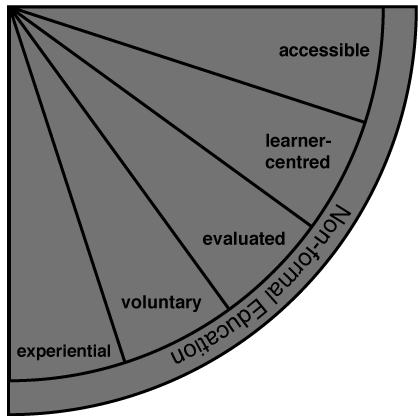
We suggest to derive five characteristics from this and argue that non-formal youth work projects on European Citizenship should be (in no specific order of priority):
- be accessible (make results available, have a planned follow-up, valorise outcome),
- be learner-centred (based on participants’ needs and co-constructed with them),
- be evaluated (assessed in a collective process without judgement on individuals),
- be voluntary (based on the intrinsic motivation and self-responsibility of learners),
- be experiential (based on collective and individual experiences of people).
On youth work
In a discussion paper written in May 2006, Peter Lauritzen described youth work like this:
“The main objective of youth work is to provide opportunities for young people to shape their own futures.
Youth work is a summary expression for activities with and for young people of a social, cultural, educational or political nature. Increasingly, youth work activities also include sports and services for young people. Youth work belongs to the domain of ‘out-of-school’ education, most commonly referred to as either non-formal or informal learning.
The general aims of youth work are the integration and inclusion of young people in society. It may also aim towards the personal and social emancipation of young people from dependency and exploitation.
Youth Work belongs both to the social welfare and to the educational systems. In some countries it is regulated by law and administered by state civil servants, in particular at local level. However, there exists an important relation between these professional and voluntary workers, which is at times antagonistic, and at others, cooperative.
The definition of youth work is diverse. While it is recognised, promoted and financed by public authorities in many European countries, it has only a marginal status in others where it remains of an entirely voluntary nature. What is considered in one country to be the work of traditional ‘youth workers’ — be it professionals or volunteers – may be carried out by consultants in another, or by neighbourhoods and families in yet another country or, indeed, not at all in many places.
Today, the difficulty within state systems to adequately ensure global access to education and the labour market, means that youth work increasingly deals with unemployment, educational failure, marginalisation and social exclusion.
Increasingly, youth work overlaps with the area of social services previously undertaken by the Welfare State. It, therefore, includes work on aspects such as education, employment, assistance and guidance, housing, mobility, criminal justice and health, as well as the more traditional areas of participation, youth politics, cultural activities, scouting, leisure and sports.
Youth work often seeks to reach out to particular groups of young people such as disadvantaged youth in socially deprived neighbourhoods, or immigrant youth including refugees and asylum seekers. Youth work may at times be organised around a particular religious tradition.”
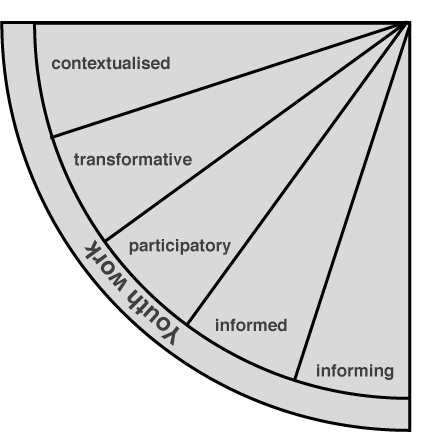
On the basis of that description, we suggest the following set of five characteristics for non-formal youth work projects on European Citizenship, which should (in no specific order of priority):
- be contextualised (rooted in local, authentic situations, communities and needs),
- be transformative (improving life situations of people, leading to action and change),
- be participatory (with progressive involvement and empowerment of young people),
- be informed (by relating to current discourses and research on issues related to the project),
- be informing (providing information and feedback to policy, practice and research).
On intercultural learning
In a 2005 discussion paper on culture and intercultural learning, Gavan Titley argues that
“[while] intercultural learning has become a key work area in European youth training during the last fifteen years, […] approaches that have been consolidated and widely reproduced during this period are no longer adequate to the realities in which young people live and practice youth work.”
The paper “contends that widely-utilised notions of culture, and the methodologies that propagate them, are both analytically and politically inadequate,” and puts forward a number of recommendations for educational practice.
Based on the considerations discussed there and elsewhere, we suggest that non-formal youth work projects on European Citizenship should (in no specific order of priority):
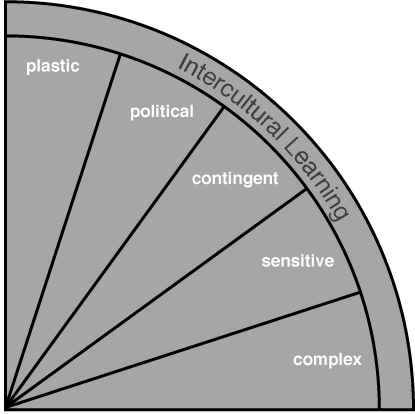
- be plastic (exploring cultural realities and conceptual understandings of culture),
- be political (conscious of contesting discourses on culture and their political relevance),
- be contingent (aware of the contexts and purposes of intercultural dialogue processes),
- be sensitive (to culture as a ubiquitous, de-politicised concept in need of re-calibration),
- be complex (explore identity and connectivity beyond culture, individuals and Europe).
On open questions
This is a first version of the «Wheel of European Citizenship». Clearly, the jury is still out on whether the approach developed here is relevant and useful at all: discussions with trainers will validate our experiences against a wider spectrum; training courses will show whether the model holds up in dialogue with practitioners. Beyond these foreseeable fora for exchange we invite everyone to share their thoughts, concerns, questions and critiques with us. Two questions, to get you started:
1) Have we captured the essence of non-formal youth work projects on European Citizenship?
2) If you are inclined to follow our approach of characterising projects descriptively by using adjectives: what about features like being concrete, diverse, relevant, empowering, interactive, critical, reflexive — to name but a few…?
The Wheel of European Citizenship
Bringing the different parts of the wheel together gives you this overview of non-formal youth work projects on European Citizenship, which should combine:

and in doing so, have the following characteristics (in no specific order of priority):

The final «Wheel of European Citizenship» is bringing the different thoughts and characteristics together in one coherent, visual model:
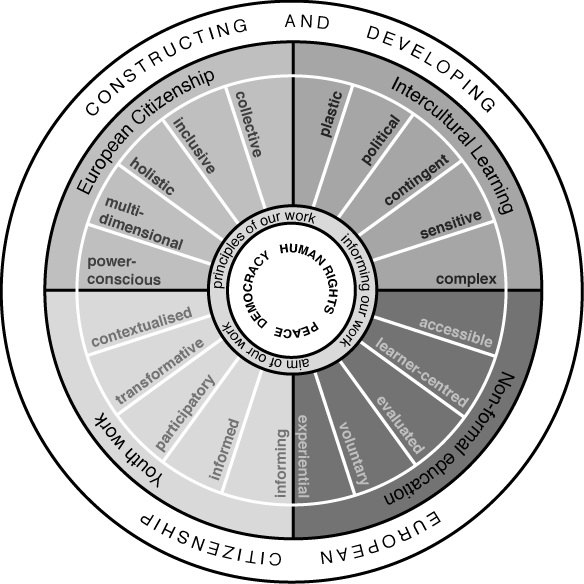
Conclusion
C O N C L U S I O N
This article contends that non-formal youth work in the framework of the «Youth in Action» programme actively constructs European Citizenship for, with and through value-based European communities of practice by facilitating intercultural learning and dialogue through projects based on the principles of youth work and non-formal education.
For each of the four spheres (youth work, non-formal education, intercultural learning, and European citizenship) we present five basic project characteristics (some of which are as intersecting and interrelated as the four themes necessarily are) and hence put forward a set of twenty features for non-formal youth work projects on European Citizenship, visualised as the «Wheel of European Citizenship».
We suggest that the wheel may well be used as a tool for project planning and, potentially, project management as well as an indicative instrument for the valorisation of project results.
But the model presented here also has clear limitations: Firstly, characteristics are descriptive and not measurable; they are neither quality criteria nor project indicators. It will require substantial effort to develop our approach further before it can become a meaningful tool for the recognition and validation of non-formal learning. Secondly, there is an entire range of other youth and community work out there that the model disregards; though we believe it would be possible with manageable effort to adapt the wheel accordingly.
Our thoughts and proposals are mainly based on the extensive experiences from a range of activities on European Citizenship run by the Council of Europe and the European Commission in partnership between 1998 and 2006. Clearly, there is more relevant experience available, and — being aware of this — we warmly invite you to share your comments and considerations on what we have developed here.
Note on the context of this paper
This text was put together by Andreas Karsten inspired by discussions with Paola Bortini, Florian Cescon, Rui Gomes, Erzsebet Kovacs and Tatiana State in the framework of the development of a new network training course on European Citizenship for the «Youth in Action» programme. Please consider it as what it is: a working document and the personal opinion of the author.
As always, comments are appreciated. Express your opinion here on this website or send an email to Andreas. Thank you!
The graphics contained in this document are all self-made by the author specifically for this text and can be used unchanged, given that the source is quoted.
Sources and resources
Sources and resources
All documentations, reports and evaluations in relation to pilot courses and training modules on European Citizenship between 1998 and 2006, and in addition:
Brocke, Hartmut and Karsten, Andreas (eds) (2007): Towards a common culture of co-operation between civil society and local authorities. Human Rights Education and youth participation. Centre Francais de Berlin, Berlin.
Castells, Manuel (1997): The Power of Identity. Blackwell, London.
Chisholm, Lynne and Hoskins, Bryony (2005): Trading up. Potential and performance in non-formal learning. Council of Europe, Strasbourg.
Colley, Helen et al (2003): Informality and formality in learning. Learning and Skills Research Centre, London.
Cummings, Andrew (2003): Youth work’s contribution to non-formal education. Council of Europe, Strasbourg.
DG EAC (2007): Youth in Action Programme 2007-2013. Users Guide. European Commission, Brussels.
Erle, Jacob (2005): Multilayered Democracy and European Citizenship. International Academy for Education and Democracy, Copenhagen.
Freire, Paulo (1972): Pedagogy of the Oppressed. Penguin, Harmondsworth.
Freire, Paulo and Shor, Ira (1987): A Pedagogy for Liberation. Dialogues on transforming education. Greenwood Press, Westport.
Holder, Sharon and Titley, Gavan (2004): Resituating culture — seminar reflections. In Coyote Vol 8 2004. Council of Europe and European Commission, Strasbourg and Brussels.
Jeffs, Tony and Smith, Mark (2005): Informal education: conversation, democracy and learning. Educational Heretics Press, Nottingham.
Karsten, Andreas (2007): 12 characteristics of successful co-operation projects. In: Brocke and Karsten (ibid).
Karsten, Andreas (2003): Better youth workers? Better citizens? The impact of the pilot courses on European Citizenship. Partnership, Strasbourg.
Karsten, Andreas (2000): Staying alive: the non-formal education domain in Europe. European Youth Forum, Brussels.
Kovacs, Erzsebet (2007): European Citizenship. Unpublished working document.
Küntzel, Bastian and Karsten, Andreas (2007): Forum on Intercultural Dialogue. Discussion paper based on the Forum. INGO Assembly of the Council of Europe, Strasbourg.
Lauritzen, Peter (2006): Defining youth work. Council of Europe, Strasbourg.
Lauritzen, Peter (2006): The role of research. Podcast, Youth Debate and Nonformality.
Lauritzen, Peter et al (2004): Pathways towards validation and recognition of education, training and learning in the youth field. Working paper. Council of Europe, Strasbourg and European Union, Brussels.
Martinelli, Silvio and Taylor, Mark (eds) (2000): Intercultural Learning T-Kit. Council of Europe and European Commission, Strasbourg and Brussels.
Merry, Peter (ed) (2003): Under construction. European Citizenship T-Kit. Council of Europe and European Commission, Strasbourg and Brussels.
Otten, Hendrik (2006): Quality on European youth work and youth policy. Conference conclusions. Bonn, 2006.
Otten, Hendrik (ed) (2004): Interkulturelles Lernen in Theorie und Praxis. Ein Handbuch für Jugendarbeit und Weiterbildung. Verlag für Sozialwissenschaften, Wiesbaden.
Otten, Hendrik and Lauritzen, Peter (eds) (2004): Jugendarbeit und Jugendpolitik in Europa. Verlag für Sozialwissenschaften, Wiesbaden.
Rogers, Alan (2003): Inside youth work. YMCA College, London.
Sahlberg, Pali (1999): Bridges for learning: conceptualising non-formal education. European Youth Forum, Brussels.
Smith, Linda and McNeil, Bethia (2004): Success factors in informal learning. Learning and Skills Research Centre, London.
Smith, Mark J. (2001): Culture. Reinventing the Social Sciences. Open University Press, Buckingham.
Titley, Gavan (2005): Plastic, Political and Contingent. Culture and Intercultural Learning in DYS activities. Discussion document based on the evaluation of the LTTC Intercultural Learning and recent research activities. Council of Europe, Strasbourg.
Titley, Gavan (ed) (2004): Resituating Culture. Council of Europe, Strasbourg.
Tucket, Allan (2004): Recognising and recording progress and achievement in non-accredited learning. Learning and Skills Development Agency, London.
Welsch, Wolfgang (1999): Transculturality: the puzzling forms of cultures today. In: Featherstone and Lash (eds): Space of Culture. Sage, London.